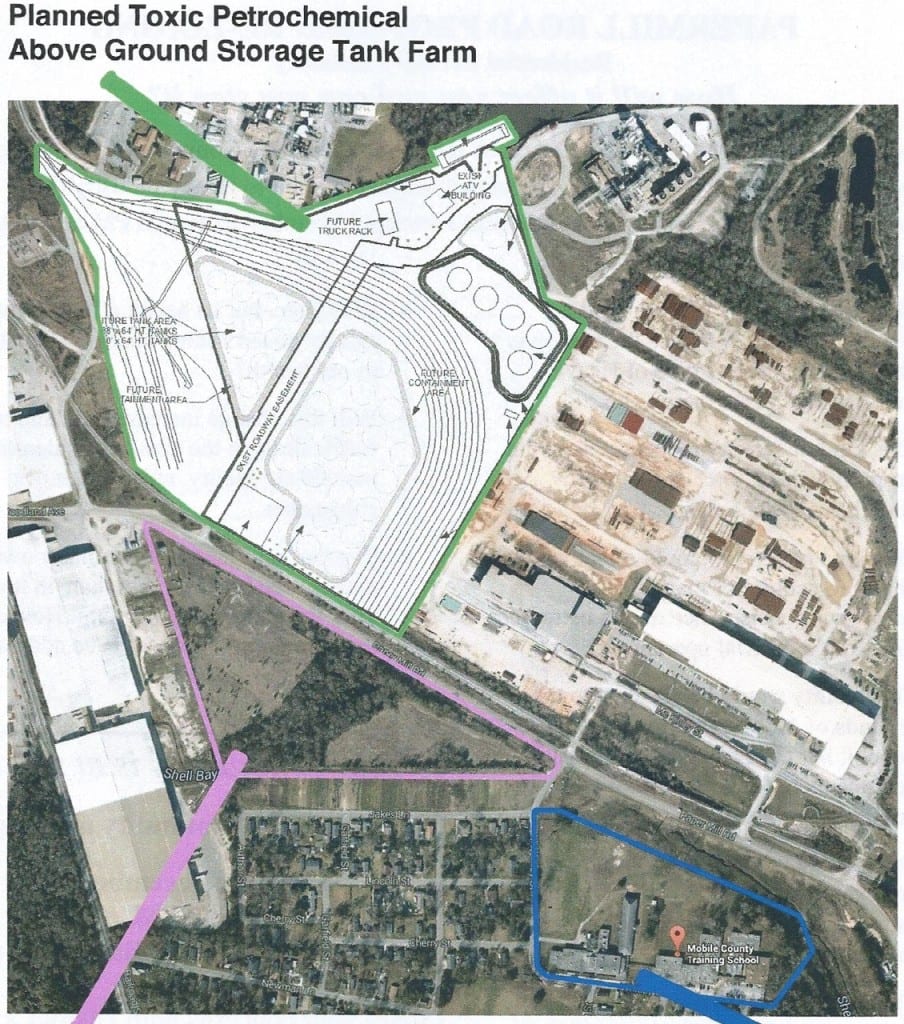Planning Commission Denies Rezoning
By Glynn Wilson –
MOBILE, Ala. — More than 140 residents of Africatown turned out at a town hall public meeting Tuesday night to oppose an industrial rezoning that would open the way for a steel storage warehouse right across the street from a proposed tar sands crude oil tank city that is so controversial it is on hold in a moratorium imposed by the Mobile City Council.
Bob Collins, owner of Bay Steel and a friend of Alabama State Port Authority director James K. “Jimmy” Lyons, told the residents in attendance that his business would cause no pollution or harm the health of people in the community.
But for two hours, resident after resident stood up to oppose it anyway, making it clear that the struggling historic neighborhood does not want any more heavy industry in the area where the last African slave ship came to America to sell human beings as property.
International Paper had a plant in the neighborhood for many years, until the company pulled and out and moved to Russia when the Soviet Union collapsed and opened the Siberian forests up for cutting.
District 2 City Council Representative Levon Manzie moderated the meeting and introduced Collins to the crowd, vowing that he would be on the peoples’ side no matter what.
The Mobile Planning Commission is set to vote on the rezoning on Thursday in a meeting that starts at 2 p.m. Many residents urged Mr. Collins to voluntarily delay the vote to give residents time to study the proposal and come up with an alternative.
Planning Commission Refuses to Rezone
Confronted by one businessman seeking a zoning change and a resistant community, the Mobile planning commission denied the request on a 9-1 vote Thursday, December 18.
After the owner of the contested acreage, Bob Collins, made his pitch to the commission four opponents, backed by dozens of attending supporters, asserted that changing the zoning from residential to industrial would continue a chopping and squeezing process that has shrunk the size and vitality of the neighborhood. Eventually this industrialization would defeat any hopes of developing Africatown into a tribute to its unique history.
To advance that vision they again offered to enter into negotiations with Collins for purchase of the land, as they had done at the community meeting two days before. And he declined again, preferring an immediate vote by the commission rather than a delay for any such negotiations.
They voted decisively against him. Most offered no explanation of their reasons, but among those who did the historical status of the area seemed to weigh heavily. Although the tract in question lies just outside the boundary of the locally and nationally recognized Africatown historic district, the commissioners acknowledged that industry crowding against it would diminish its quality. And they acknowledged the efforts to expand the district’s formal boundaries, which would then include this tract.
The vote is final unless the owner exercises his right of appeal to the city council. Or he might try to sell the parcel back to the party he bought it from, the port authority. Then he might lease it from them and continue with his same project. Or any other heavy industry might arrive under similar arrangements because the port authority, as a state agency, is exempt from local zoning regulations.
But meanwhile the community, after months of planning and mobilizing, has won a major battle, if not yet complete victory.
To see our previous coverage of related stories, this is a good place to start.
Mobile Alabama’s Historic Africatown At Risk From Tar Sands Oil Storage Tanks, Pipelines
Before you continue, I’d like to ask if you could support our independent journalism as we head into one of the most critical news periods of our time in 2024.
The New American Journal is deeply dedicated to uncovering the escalating threats to our democracy and holding those in power accountable. With a turbulent presidential race and the possibility of an even more extreme Trump presidency on the horizon, the need for independent, credible journalism that emphasizes the importance of the upcoming election for our nation and planet has never been greater.
However, a small group of billionaire owners control a significant portion of the information that reaches the public. We are different. We don’t have a billionaire owner or shareholders. Our journalism is created to serve the public interest, not to generate profit. Unlike much of the U.S. media, which often falls into the trap of false equivalence in the name of neutrality, we strive to highlight the lies of powerful individuals and institutions, showing how misinformation and demagoguery can harm democracy.
Our journalists provide context, investigate, and bring to light the critical stories of our time, from election integrity threats to the worsening climate crisis and complex international conflicts. As a news organization with a strong voice, we offer a unique, outsider perspective that is often missing in American media.
Thanks to our unique reader-supported model, you can access the New American journal without encountering a paywall. This is possible because of readers like you. Your support keeps us independent, free from external influences, and accessible to everyone, regardless of their ability to pay for news.
Please help if you can.
American journalists need your help more than ever as forces amass against the free press and democracy itself. We must not let the crypto-fascists and the AI bots take over.
See the latest GoFundMe campaign here.
Don't forget to listen to the new song and video.
Just because we are not featured on cable TV news talk shows, or TikTok videos, does not mean we are not getting out there in search engines and social media sites. We consistently get over a million hits a month.
Click to Advertise Here















